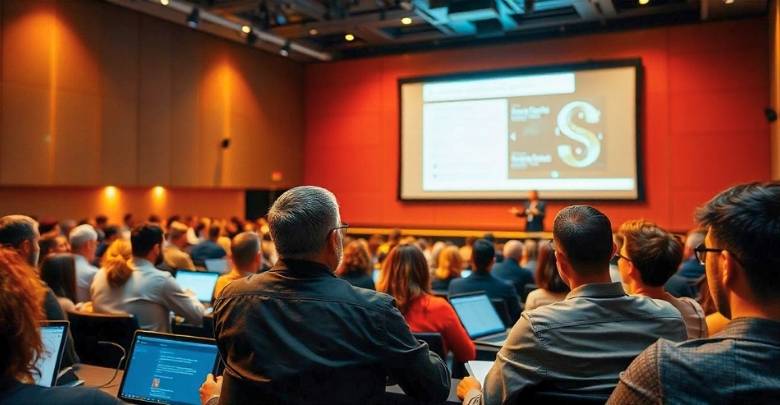International applied science conferences bring together scholars from various research fields. They feature academic sessions, keynote talks, and discussions on the latest topics. Some people often wonder: How to find international applied science conferences?
You can find international applied science conferences in 2025 by visiting conference organizer websites like Global Conference Alliance Inc. and exploring university event pages. Follow professional organizations, and search social media hashtags for updates on relevant events globally.
Do you want to know more about these events? We invite you to continue reading for extra details. Within this article, you will find every crucial insight, including tips on reputable sources, academic communities, and regional events that may help.
How to Find International Applied Science Conferences in 2025?
Finding the right international applied science conferences can help you connect with experts, learn about new trends, and grow academically. With the right steps, you can identify the perfect conferences to attend. Below are practical tips to help you.

Check Professional Conference Organizer Websites
Begin your search on conference organizer websites like Global Conference Alliance Inc. These platforms regularly update their listings with reliable information on applied science conferences. For instance, if you’re looking for an international applied sciences conference in Canada, these sites are likely to feature such events. Bookmark them and check often for updated schedules and deadlines.
Use Academic Databases
Academic databases such as Google Scholar provide information on upcoming conferences. These platforms often list events alongside related publications, making it easier to match your research interests with conference topics. Use specific search filters for applied sciences and set notifications for updates about events happening in 2025.
Follow Professional Organizations
Professional organizations in applied sciences often organize or list major conferences. Their official websites or newsletters provide essential details, including dates and submission guidelines. Subscribing to their email updates ensures you stay informed about major events relevant to your interests.
Explore University Websites
Top universities often host international applied science conferences. Visit their event pages or research centers’ websites to find upcoming events. These pages often provide comprehensive information, including keynote speakers and topics. Look for universities with strong applied science departments for a higher chance of finding conferences suited to your academic goals.
Join Academic Networking Platforms
Networking platforms are excellent resources for discovering conferences. Researchers and academics frequently share announcements about upcoming events. You can also engage with the community, ask for recommendations, or follow specific researchers who might attend or organize these conferences.
Use Conference Websites
You can filter your search by selecting “Applied Sciences” and adding a preferred location or year. These platforms also allow you to subscribe to notifications, which will ensure that you do not miss any important events in the year 2025.
Search Through Social Media
Social media platforms like LinkedIn and Twitter are rich sources for conference updates. Use hashtags such as #AppliedSciencesConference or #ScienceConferences2025 to discover relevant posts. Following event organizers or industry leaders can also help you stay updated about announcements, schedules, and participation opportunities.
Ask Your Professors or Advisors
Your professors or research advisors can be invaluable sources for finding conferences. Many are actively involved in international networks and are familiar with the most reputable events. They can guide you on the best conferences for your field and might even facilitate your participation as a presenter or attendee.
Attend Regional Events First
For bigger international conferences, regional gatherings can serve as a springboard. These smaller events provide a platform to network with local professionals, many of whom are involved in organizing or attending global events. Building connections here may open doors to recommendations for international applied science conferences in 2025.
By following these steps, you’ll be well-prepared to find and attend international applied science conferences in 2025. Stay proactive and organized to ensure you make the most of these valuable academic opportunities.
Benefits of Subscribing to Conference Websites for Updates
Staying updated on the latest conferences in your field can be a great way to enhance your learning and networking opportunities. Subscribing to conference websites makes it easier to receive notifications and never miss an important event. Let’s explore the benefits in more detail.
Receive Timely Updates
By subscribing to conference websites, you can receive timely notifications directly to your inbox about upcoming events, deadlines, and submission opportunities. This allows you to plan your participation in conferences well in advance and ensures that you don’t miss any important event or deadline that could benefit your academic or professional growth.
Access to a Variety of Events
You can access a vast array of conferences, seminars, and workshops by using conference platforms, which list events from different fields and disciplines. This helps you stay aware of new developments in different areas, explore topics of interest, and choose events that align with your academic or career goals without spending hours searching for them.
Simplified Registration Process
When you subscribe to conference websites, the process of registering for conferences becomes much easier. The platform will often provide direct links and clear instructions, reducing the time you would otherwise spend managing different event websites. This streamlined process makes conference participation more accessible and less stressful.
Stay Informed on Industry Trends
Conference websites often feature the latest events, focusing on the latest research and industry trends. Subscribing to these platforms helps you stay updated on the most relevant topics, ensuring that you are always aware of what’s new in your field and can integrate this knowledge into your academic or professional work.
Networking Opportunities
Subscribing to conference websites not only helps you find events but also increases your chances to network with professionals, academics, and peers. Knowing about conferences in advance allows you to connect with key speakers, fellow attendees, and organizations, building valuable professional relationships for future collaborations or career advancement.
Subscribing to conference websites helps you stay organized, informed, and connected. It saves time, improves your learning experience, and provides opportunities to engage with professionals and peers, benefiting both your academic and career development.
Effective Strategies for Filtering Applied Science Conferences
When searching for applied science conferences, applying specific filters or criteria can help you narrow down the vast array of events. Using the right filters ensures that you find conferences that align with your research interests and professional goals. Let’s explore some strategies to help you in this process.
Focus on Specific Research Areas
Applied sciences cover many fields, from environmental science to engineering. To find the most relevant conferences, focus on specific subfields, like “biotechnology” or “data science.” If you are interested in finding an applied sciences conference in Canada, you can filter by subject area and location to find the best match.
Conference Format
The format of conferences can be in-person, hybrid, or virtual. If attending a physical conference is essential for networking, look for in-person events. Virtual and hybrid conferences provide flexibility, so choosing the right format is important to meet your needs and expectations.
Consider the Event Dates
There are conferences all year long, and the timing of an event is crucial. Narrow down your search by selecting time frames that suit your schedule. Whether you’re looking for events this summer or next fall, filtering by dates helps you find conferences that fit your academic and professional calendar.
Location-Based Filters
If you’re targeting specific regions, like Europe or North America, you can filter conferences by location. Whether you prefer conferences closer to home or want to explore international options, location-based filters help you focus on the best events for your goals.
Review Conference Reputation
Ensure that the conference has a good reputation. Consider events hosted by well-established organizations, universities, or institutions. Look for previous keynote speakers and attendee reviews. By applying this filter, you ensure that the conference you choose will provide high-quality sessions and networking opportunities.
Applying the right filters, such as focusing on a specific research area, format, dates, location, and reputation, can significantly improve your search for applied science conferences. This ensures you attend events that match your professional and academic objectives.
Who Should You Follow on Social Media for Applied Science Conference Updates?
Staying up-to-date on applied science conferences is important for keeping track of new research and networking opportunities. Social media platforms can be a powerful tool for finding out about these events. Here are some suggestions on who to follow for conference updates.
- Professional Societies: Following specific field-based societies keeps you updated on relevant conferences and scientific discussions.
- University Departments: Many academic institutions regularly post about their conferences or events. Following university pages or individual department accounts can help you learn about specialized conferences in your field.
- Research Journals: Journals like “Nature” and “Science” often share conference updates related to the latest trends and advancements in applied sciences. Their social media pages are good sources.
- Event Organizers: Companies and organizations that manage applied science conferences often have dedicated social media pages. These accounts are great for official event updates, deadlines, and registration details.
- Conference Speakers: Well-known scientists and researchers in your field frequently post about upcoming conferences they are attending or speaking at. Following them provides valuable insider information on events.
- Collaborative Networks: Follow online platforms or groups such as LinkedIn’s scientific networks. These communities often share conference opportunities, collaborations, and other events happening in applied science.
- Science News Websites: Websites that specialize in science news often share conference details or even live tweet during the events. Following them will keep you in the loop on upcoming conferences.
Following the right accounts on social media will help you stay informed about applied science conferences and ensure you never miss important opportunities to learn or network with peers and experts.
How Can LinkedIn Be Used to Find International Applied Science Conferences?
A great way to find international conferences in applied science is to use LinkedIn to connect with global experts. By using its features effectively, you can stay updated on key events. Here’s how to find conferences on LinkedIn.
Follow Relevant Organizations
By following applied science societies, universities, and research institutions on LinkedIn, you’ll receive updates about international conferences, seminars, and webinars. These organizations frequently post about upcoming events, often providing links to registration details and conference schedules, making it easier for you to stay informed about global conferences in applied science.
Join Professional Groups
LinkedIn has many professional groups focused on specific fields of applied science. By joining these groups, you can engage with others in your field and gain access to posts about upcoming conferences and events. Group members often share valuable insights, and by being part of these groups, you stay connected to the global conference scene.
Search Hashtags
Hashtags are a powerful way to discover relevant content on LinkedIn. Searching hashtags like #AppliedScience, #InternationalConferences, or #ScienceEvents will direct you to posts that share information about upcoming conferences. This feature helps you quickly access useful content and stay up-to-date on events happening in the applied science field worldwide.
Connect with Conference Organizers
Many conference organizers, event planners, and academic leaders have LinkedIn profiles. By connecting with them or following their pages, you can directly receive updates on international applied science conferences. They may post important registration details, speaker information, and other key updates about global events that may interest you.
Utilize LinkedIn Events
You can locate and attend a large number of conferences and seminars taking place all over the world with LinkedIn Events. You can search for applied science events by using keywords, check event details, and interact with other attendees. LinkedIn also sends reminders, ensuring you never miss out on important conferences in your field.
LinkedIn offers a range of tools to help you stay connected and updated on international applied science conferences, making it easier to participate in global events and advance your knowledge.
Why is Networking With Researchers Effective for Discovering Upcoming Science Conferences?
Finding science conferences requires networking with researchers, who are frequently very active in academic and professional circles. Establishing connections with researchers can provide great opportunities to learn about events and stay informed. Below are the reasons why networking is so effective.
Access to Insider Information
Researchers often have early access to conference details, including important dates, speakers, and special sessions. By building connections, you can get insider information about upcoming conferences before they are publicly advertised, ensuring that you are always ahead of the game and well-prepared for important events in your field.
Personalized Recommendations
When you connect with researchers, they can offer individualized conference suggestions based on their own experiences and knowledge of your academic interests. These personalized recommendations help you discover events that you may have otherwise missed, ensuring you participate in conferences that align with your research and career aspirations.
Opportunities for Collaboration
Engaging with researchers can lead to collaborative opportunities. During discussions, they may mention upcoming conferences where you can present joint research or find collaborators for future projects. Such collaborations often highlight the benefits of attending an applied science conference and how they can advance your academic or professional interests.
Access to Research Communities
Researchers are typically part of academic or professional networks that share conference information regularly. By connecting with them, you gain access to these networks, making it easier to find relevant conference details, workshops, and seminars in applied sciences. This opens the door to a broader range of global academic events.
Potential to Join Panels or Workshops
Building strong connections with researchers can lead to invitations to participate in conference panels, workshops, or discussions. These invitations provide excellent opportunities for you to showcase your work, gain feedback, and expand your academic network. Such events allow you to engage directly with experts in your field.
Networking with researchers is an effective way to stay informed about science conferences. By maintaining these connections, you gain valuable insights into upcoming events and enhance your opportunities for collaboration, learning, and professional growth.
Methods for Finding Science Conferences Using Keywords
Locating science conferences worldwide can be overwhelming without the right tools and strategies. Using specific keywords in your search simplifies the process and helps you find events according to your interests. Here are some effective ways to use keywords for this purpose.
Identify Core Topics and Keywords
Begin by identifying core topics in your area of interest, such as “biotechnology,” “neuroscience,” or “data science.” Pair these terms with “conference,” “symposium,” or “workshop.” This combination allows you to narrow your search to conferences that directly relate to your specific field, ensuring relevant results and saving you time.
Include Geographic Modifiers
If you’re interested in a specific location, include geographic modifiers like “Europe,” “Asia,” or specific country names such as “USA” or “Canada.” This helps narrow down the search to conferences in your preferred region, so you can find international events or local meetups that best suit your location preferences.
Add Time-Specific Terms
To filter results by timing, add keywords like “2025,” “spring,” or “summer.” This helps you find conferences happening in the timeframe that fits your schedule. By focusing on specific months or years, you ensure that you’re aware of events that are happening when you’re available to attend them.
Use Advanced Search Filters
Many conference platforms and search engines offer advanced search filters. You can combine keywords like “AI conference 2025 Europe” with other filters such as event type or specific topics. This enables a more targeted search and ensures the events you find are the most relevant to your interests.
Search Using Conference Types
Include terms related to the type of conference you’re looking for, such as “virtual,” “hybrid,” or “international.” If you prefer online events or need to attend an international conference, these terms refine your search. It ensures you find conferences with formats that meet your participation preferences.
Using specific keywords when searching for science conferences is an effective way to streamline your efforts. By combining core topics, location, timeframes, and conference types, you can quickly find events that align with your goals and interests.
How to Verify the Authenticity of a Science Conference Found Online?
When searching for science conferences online, it’s crucial to verify their authenticity before committing to attendance or submission. Many fake conferences promise high exposure but fail to deliver. To avoid falling for scams, follow these simple steps outlined below.
Review the Organizers’ Credentials
Check the conference’s official website and confirm the credentials of the organizers. Reputable organizations usually provide detailed information about their background and past events. Look for affiliations with well-known institutions or professional bodies. If the organizers lack transparency, the conference might not be genuine.
Investigate the Venue and Date
A legitimate conference will always list a clear and verifiable venue along with the exact dates. Research the event location to see if the venue exists and can accommodate a conference. Scammers may list vague or unreachable locations, or change the date unexpectedly, which should raise suspicion.
Check for Peer-Reviewed Content
If a conference promises publication in journals, verify that these journals are indexed in respected databases such as Scopus or PubMed. Look for information on whether the papers are peer-reviewed. Lack of clear peer review procedures can indicate an unreliable event, and you might waste your efforts.
Examine the Registration Fees
A reasonable conference fee covers organizational costs, but extremely high registration fees or unusual payment methods can be a red flag. Scammers often request payment through untraceable means or demand fees before providing any event details. Research the typical costs of similar conferences to ensure it’s legitimate.
Search for Reviews or Feedback
Look for reviews or feedback from previous attendees. Search for discussions about the conference on platforms like LinkedIn or academic forums. Genuine conferences often have testimonials or references from past participants. A lack of feedback or negative reviews could indicate that the event is not reputable.
Always take the time to verify a conference before registering. Ensure that it meets the standards of credibility and professionalism to avoid wasting time and money on potentially fake events. Verification steps can save you from unpleasant surprises.
Can Journals Provide Trustworthy Information About Upcoming International Applied Science Events?
Although journals are a reliable source of academic information, their reliability can vary when it comes to finding international applied science events. Ensure that you examine the type of journal and its credibility. Here’s how journals can help you find the right events.
Check Journal’s Reputation
Reputable academic journals often list credible conferences related to applied sciences. Look for well-known, peer-reviewed journals that focus on your field. Established journals are more likely to share information about authentic events and collaborate with respected organizers in the academic community.
Verify Conference Listings in Specialized Journals
Some journals specialize in listing upcoming conferences and events in particular fields. These specialized journals are often more trustworthy when it comes to event recommendations. Ensure the journal’s conference section is up-to-date and regularly maintained, which indicates its reliability for providing relevant event details.
Cross-Reference with Other Sources
To verify information, cross-check conference listings found in journals with other trusted platforms. Search on websites or academic networking sites. If the same events are listed across multiple trusted sources, it’s a good sign the information is accurate and trustworthy.
Look for Endorsements and Affiliations
A well-established journal may include endorsements from respected academic institutions, professional organizations, or societies that sponsor the conference. These endorsements increase the credibility of the events listed. Check if the event is backed by credible academic or scientific bodies to ensure legitimacy.
Assess the Frequency of Listings
Journals that consistently list events throughout the year tend to offer trustworthy information. If a journal regularly features conferences with proper details and is not limited to just one-time event listings, it’s more likely to be a reliable source for upcoming applied science conferences.
While journals can provide valuable information about international applied science events, always verify the event details through additional trusted platforms. A multi-source approach will ensure you attend credible and beneficial conferences for your academic goals.
FAQs About Finding International Applied Science Conferences
Finding the right international applied science conferences can be challenging, but necessary for academic growth and professional networking. Below are frequently asked questions to guide you in discovering the best conferences that align with your goals.
What Are Reliable Platforms to Search for Science Conferences?
Reliable platforms include conference directories such as Global Conference Alliance Inc. These sites list global conferences with filters for topics, locations, and dates. Using trusted platforms ensures you receive accurate information about upcoming applied science events without worrying about unreliable sources or fake conferences.
How Can I Use University Networks to Discover Conferences?
University networks, such as department newsletters or research group emails, often share information about relevant conferences. Attend campus events where professors and peers may discuss upcoming international conferences. University-affiliated research centers also post event details on their websites, making them a great resource for discovering applied science conferences.
What Role Do Science Podcasts Play in Finding Conferences?
Science podcasts often feature interviews with researchers and experts who discuss upcoming conferences. They may provide insights into popular events and their focus areas. Follow podcasts in your field, as hosts or guests frequently share details about conferences where they are speaking or presenting their research.
Can International Collaborations Help in Finding Conferences?
Yes, working with international collaborators can expose you to conferences abroad. Collaborators often have access to networks and event details in their region. They may recommend conferences you wouldn’t otherwise find. Maintaining these relationships can provide insider knowledge about international applied science events.
How Can Science Magazines Help in Identifying Conferences?
Magazines like Scientific American and New Scientist often feature advertisements or dedicated sections for upcoming conferences. These are usually well-vetted and relevant to their readers. Subscribing to such magazines gives you access to both major international events and smaller, niche applied science conferences.
Are Government Websites Useful for Finding Conferences?
Government websites related to science and research often promote conferences and events they sponsor. These include national or international conferences focusing on applied sciences. Check the science or technology department’s page for announcements. Government-affiliated events are generally credible and aligned with current research priorities.
End Note
Attending international applied science conferences is an effective way to expand your knowledge, make professional connections, and stay up-to-date on developments. Utilizing various resources like conference directories, university networks, and social media can simplify this process and ensure you discover valuable opportunities.
When considering how to find international applied science conferences, focus on using platforms like academic databases, research communities, and trusted websites. Combine these with targeted keywords and filters to pinpoint events that align with your interests, location, and schedule. These tools make it easier to uncover credible and relevant conferences worldwide.
As you explore these opportunities, remember to plan by setting reminders for registration deadlines and staying active in academic communities for updated recommendations. Wishing you success in finding conferences that advance your academic and professional goals. Best of luck.









